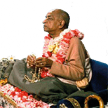Vaidarbhi - a glorious personality: Difference between revisions
(Created page with "Category:Glorious Personalities Category:Glorious Personalities from Bhagavad Gita Category:Glorious Personalities from Srimad Bhagavatam Category:Glorious Perso...") |
No edit summary |
||
| Line 10: | Line 10: | ||
{{Personalitiesnav}} | {{Personalitiesnav}} | ||
<!----------------- BEGIN STANDARD HEADING -----------------> | <!----------------- BEGIN STANDARD HEADING -----------------> | ||
Srila Prabhupada's books, lectures, conversations and letters reveal the qualities of this glorious personality as seen in the Vaniquotes '''[[Vaniquotes:Category:Vaidarbhi|Vaidarbhi]]''' category. An introduction from his teachings is given below in the following | Srila Prabhupada's books, lectures, conversations and letters reveal the qualities of this glorious personality as seen in the Vaniquotes '''[[Vaniquotes:Category:Vaidarbhi|Vaidarbhi]]''' category. An introduction from his teachings is given below in the following 8 quotes. | ||
<!----------------- END STANDARD HEADING -----------------> | <!----------------- END STANDARD HEADING -----------------> | ||
---- | ---- | ||
== Quotes from Srila Prabhupada's teachings == | == Quotes from Srila Prabhupada's teachings == | ||
<!----------------- edit quote boxes below this line -----------------> | <!----------------- edit quote boxes below this line -----------------> | ||
{{VaniQuotebox| | {{VaniQuotebox|If by karma-kanda activities one by chance comes in contact with a devotee, as Vaidarbhi did when she married Malayadhvaja, his life becomes successful|Vaidarbhī refers to one who takes birth in a family of karma-kāṇḍīya understanding. However, if by karma-kāṇḍa activities one by chance comes in contact with a devotee, as Vaidarbhī did when she married Malayadhvaja, his life becomes successful. He then pursues the devotional service of the Lord. The conditioned soul becomes liberated simply by following the instructions of the bona fide spiritual master. '''(Śrīmad-Bhāgavatam 4.28.65)'''}} | ||
{{VaniQuotebox| | {{VaniQuotebox|Vaidarbhi. The woman who was formerly a man but took birth as a woman in his next life because of too much attachment to woman|Vaidarbhī. The woman who was formerly a man but took birth as a woman in his next life because of too much attachment to woman. Darbha means kuśa grass. In fruitive activities, or karma-kāṇḍīya ceremonies, one requires kuśa grass. Thus vaidarbhī refers to one who takes birth in a family of karma-kāṇḍīya understanding. However, if by karma-kāṇḍa activities one by chance comes in contact with a devotee, as Vaidarbhī did when she married Malayadhvaja, his life becomes successful. He then pursues the devotional service of the Lord. '''(Śrīmad-Bhāgavatam 4.28.65)'''}} | ||
{{VaniQuotebox| | {{VaniQuotebox|Since she (Vaidarbhi) did not arrange her hair, it became entangled and twisted in locks. Although she remained always near her husband (Malayadhvaja), she was as silent and unagitated as the flame of an undisturbed fire|The daughter of King Vidarbha wore old garments, and she was lean and thin because of her vows of austerity. Since she did not arrange her hair, it became entangled and twisted in locks. Although she remained always near her husband, she was as silent and unagitated as the flame of an undisturbed fire. '''(Śrīmad-Bhāgavatam 4.28.44)'''}} | ||
{{VaniQuotebox| | {{VaniQuotebox|Figuratively, King Malayadhvaja is the spiritual master, and his wife, Vaidarbhi, is the disciple. The disciple accepts the spiritual master as the Supreme Personality of Godhead|Figuratively, King Malayadhvaja is the spiritual master, and his wife, Vaidarbhī, is the disciple. The disciple accepts the spiritual master as the Supreme Personality of Godhead. As stated by Viśvanātha Cakravartī Ṭhākura in Gurv-aṣṭaka, sākṣād-dharitvena: "One directly accepts the guru, the spiritual master, as the Supreme Personality of Godhead. '''(Śrīmad-Bhāgavatam 4.28.43)'''}} | ||
{{VaniQuotebox| | {{VaniQuotebox|King Malayadhvaja was a great devotee, and after he married the daughter of King Vidarbha, he gave her one nice daughter, whose eyes were black|King Malayadhvaja was a great devotee, and after he married the daughter of King Vidarbha, he gave her one nice daughter, whose eyes were black. Figuratively this means that the daughter of King Malayadhvaja was also bestowed with devotional service, for her eyes were always fixed on Kṛṣṇa. A devotee has no vision in his life other than Kṛṣṇa. The seven sons are the seven processes of devotional service—hearing, chanting, remembering, offering worship, offering prayers, rendering transcendental loving service and serving the lotus feet of the Lord. '''(Śrīmad-Bhāgavatam 4.28.30)'''}} | ||
{{VaniQuotebox| | {{VaniQuotebox|The daughter of King Vidarbha continued as usual to serve her husband, who was seated in a steady posture, until she could ascertain that he had passed away from the body|The daughter of King Vidarbha continued as usual to serve her husband, who was seated in a steady posture, until she could ascertain that he had passed away from the body. It appears that the Queen did not even talk to her husband while serving. She would simply perform her prescribed duties without talk. Thus she did not stop rendering service until she could ascertain that her husband had passed from the body. '''(Śrīmad-Bhāgavatam 4.28.45)'''}} | ||
{{VaniQuotebox| | {{VaniQuotebox|Suta. The son of Vaidarbhi, or, in other words, one who is somewhat advanced in fruitive activities and who comes in contact with a devotee spiritual master. Such a person becomes interested in the subject matter of devotional service|Suta. The son of Vaidarbhī, or, in other words, one who is somewhat advanced in fruitive activities and who comes in contact with a devotee spiritual master. Such a person becomes interested in the subject matter of devotional service. Vaidarbhī. The woman who was formerly a man but took birth as a woman in his next life because of too much attachment to woman. Darbha means kuśa grass. In fruitive activities, or karma-kāṇḍīya ceremonies, one requires kuśa grass. '''(Śrīmad-Bhāgavatam 4.28.65)'''}} | ||
{{VaniQuotebox| | {{VaniQuotebox|Just as the moonshine follows the moon at night, immediately after King Malayadhvaja departed for Kulacala, his devoted wife (Vaidarbhi), whose eyes were very enchanting, followed him, giving up all homely happiness, despite family and children|Just as the moonshine follows the moon at night, immediately after King Malayadhvaja departed for Kulacala, his devoted wife (Vaidarbhi), whose eyes were very enchanting, followed him, giving up all homely happiness, despite family and children. '''(Śrīmad-Bhāgavatam 4.28.34)'''}} | ||
<!----------------- edit quote boxes above this line -----------------> | <!----------------- edit quote boxes above this line -----------------> | ||
Latest revision as of 08:32, 26 December 2016
INTRODUCTION TEXT TO BE WRITTEN
Srila Prabhupada's books, lectures, conversations and letters reveal the qualities of this glorious personality as seen in the Vaniquotes Vaidarbhi category. An introduction from his teachings is given below in the following 8 quotes.
Quotes from Srila Prabhupada's teachings
Vaidarbhi - explore more within this category.
Vanipedia has now over 215 introductory articles compiled from Srila Prabhupada's teachings under the series titled Glorious Personalities. All these articles can be seen in the Table of Content on the right side of this article and also here in this Umbrella Category. Browse through them to relish the breadth and depth of Srila Prabhupada's teachings - There is an attractive personality for everyone.







